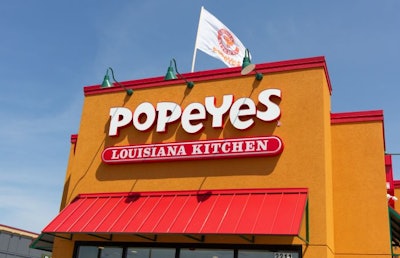
Popeyes Louisiana Kitchen plans to transition to fried chicken free of the controversial ingredient MSG by 2025, three years later than originally planned.
“We are currently testing all-clean ingredients in our batter, breading and sandwiches in a few U.S. markets and we expect to be on track to an all-clean menu nationwide by 2025,” the company said in a statement to Bloomberg.
“We had hoped to achieve this earlier, however our process of testing new ingredients and getting extensive guest feedback on recipe changes has been slowed down by a challenging supply-chain environment.”
The quick service restaurant chain initially planned to phase out the use of MSG and all other colors, flavors and preservatives derived from artificial sources in all of the brand’s fried chicken menu items by the end of 2022, according to an update to the Restaurant Brands for Good sustainability plan released in March 2021.
Chicken foodservice and retail outlets grappled with both labor and product shortages in recent years. In Australia and the U.S., product shortages disrupted operations at KFC in 2021, forcing the chain to reduce its menu at several locations. In that same year, a pickle jar shortage in the Midwest U.S. delayed the release of the Burger King chicken sandwich.
McDonald’s, Chick-fil-A also use MSG in chicken sandwiches
MSG is a common ingredient in several fried chicken sandwiches sold in foodservice, including Chick-fil-a and McDonald’s.
MSG was once widely used to enhance the flavor of foods, particularly in Asian cuisine, but fell out of favor with consumers after a (since-discredited) study linked the ingredient to a wide range of health issues. Some individuals do experience adverse effects – including headaches, fatigue and nausea – after consuming food containing MSG.
The ingredient is considered “generally recognized as safe” by the U.S. Food and Drug Administration, the agency responsible for ensuring the safety of the nation’s food supply.


















